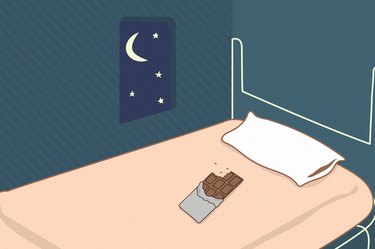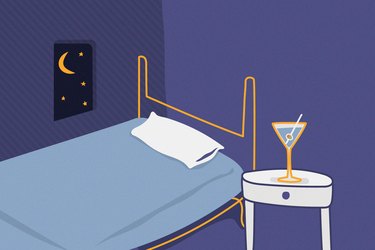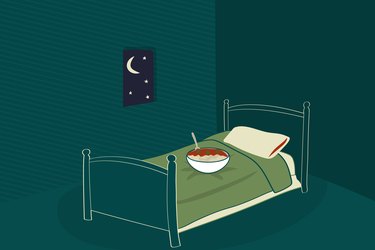
When the sun goes down and you're done with dinner, you find yourself sniffing around the pantry for something sweet. No judgment — we've all been struck by nocturnal cravings.
For many, a scrumptious square of chocolate is the perfect late-night snack to scratch the itch for sweets. But can polishing off a chocolate bar in the p.m. be problematic for your health?
Video of the Day
Video of the Day
Here, dietitian Amanda Holtzer, RD, explains why eating chocolate before bed might be a bad idea.
Risks of Eating Chocolate Before Bed
1. It Can Sabotage Your Sleep
Chocolate contains a trifecta of substances — caffeine, theobromine and sugar — that create a perfect storm for sabotaging sleep, Holtzer says.
Caffeine
When it comes to caffeinated foods, most of us think about coffee. But chocolate is a solid source of caffeine, too. And like your morning joe, it can give you a jolt of energy, which you don't need at nighttime when you're trying to wind down.
"When we consume caffeine, adenosine receptors in the brain are blocked," Holtzer says. "Adenosine receptors function to slow neural activity and the physical body down and encourage sleep."
As a stimulant, caffeine inhibits these processes. Indeed, a February 2017 systematic review in Sleep Medicine Reviews found that caffeine increased wakefulness and sleep disturbances.
Theobromine
"Theobromine is an alkaloid found in cocoa and chocolate," Holtzer says. "It's what gives cacao a bitter taste." But this compound can actually increase heart rate and cause restlessness, she says.
Dark chocolate has a higher concentration of theobromine, which is why it's less sweet, Holtzer says. And that's why it's not ideal to enjoy before bed.
Sugar
While it depends on the variety, chocolate (like other kinds of candy) can be stacked with simple sugars. Problem is, when you snack on simple sugars, glucose enters your bloodstream quickly, rapidly raising your blood sugar levels, Holtzer says.
"When blood sugar is elevated, we may experience an increase in energy levels and alertness, two feelings we don't want to experience before we are about to slumber," she says.
It's true: A high-sugar diet is linked to poor sleep quality and duration, per an August 2019 study in the American Journal of Lifestyle Medicine.
Caffeine and Theobromine Content in Dark Chocolate Chart
Most chocolate bars contain 40 to 50 milligrams of caffeine per 1.5-ounce serving, which is a square or two, per ConsumerLab. That's about the amount of caffeine you'd get from a half cup of coffee.
Here's a look at the caffeine and theobromine contents in popular chocolate brands, per ConsumerLab. Note that the serving sizes differ per brand of chocolate.
Brand | Caffeine per serving | Theobromine per serving |
|---|---|---|
Montezuma's Dark Chocolate Absolute Black 100% Cocoa | 85.3 mg | 604.5 mg |
Scharffen Berger Unsweetened -99% Cacao | 79.2 mg | 628.7 mg |
Taza Chocolate Wicked Dark 95% Dark | 67.2 mg | 414.4 mg |
Theo Sea Salt 70% Dark Chocolate | 52.5 mg | 427.4 mg |
Alter Eco Deep Dark Blackout 85% Cocoa | 50 mg | 375.6 mg |
Trader Joe's Pound Plus 72% Cacao Dark Chocolate | 47.1 mg | 508.4 mg |
Lindt Excellence Supreme Dark - 90% Cocoa | 42.4 mg | 474 mg |
Green & Black's Organic Dark Chocolate - Dark 85% Cacao | 40.5 mg | 274.5 mg |
Evolved Midnight Coconut 100% Cacao Chocolate Bar | 33.9 mg | 282.8 mg |
Endangered Species Chocolate Strong
| 32.5 mg | 321.2 mg |
Chocolove Strong Dark Chocolate 70% Cocoa | 31.8 mg | 304.5 mg |
Trader Joe's Uganda 85% Dark Chocolate Bar | 31.2 mg | 276 mg |
Lily's Sea Salt Extra Dark Chocolate 70% Cocoa | 25.5 mg | 212.7 mg |
Ghirardelli Intense Dark 72% Cacao Dark Chocolate | 20.1 mg | 157 mg |
Baker's Unsweetened 100% Cacao | 18.3 mg | 171.6 mg |
Hu Salty Dark Chocolate 70% Cocoa | 18 mg | 192 mg |
Choc Zero Sugar-Free 70% Cocoa Dark Chocolate | 5.9 mg | 51.4 mg |
2. …Or It Can Make You Sleepy
"On the other end of the spectrum, eating something sugary like chocolate before bed can also cause feelings of sleepiness," Holtzer says.
But before you go biting into your chocolate bar at bedtime, your cocoa-flavored candy isn't something you should lean on as a natural sedative.
While chocolate may make you drowsy, this isn't a positive side effect. Here's why: "When we eat a sugary treat that gives the body more glucose than it needs, the pancreas goes into overdrive, and it releases a lot of insulin in an attempt to lower your blood sugar," Holtzer says.
"Once the insulin does its job and blood sugar drops again, we can experience that 'sugar crash' sensation," she explains. In other words, the sleepy feeling is essentially sluggishness brought on by low blood sugar.
3. It Might Cause Inflammation
Many varieties of chocolate — especially milk and white chocolate — are laden with sugar.
But sugar is an inflammatory food. In other words, "when we eat it, a series of processes are carried out in the body which can increase levels of inflammation," Holtzer says.
"And over time, excessive consumption of sugar can increase a person's risk of developing chronic disease, including obesity, hypertension, high cholesterol and type 2 diabetes," she says.
To make matters worse, "an inflammatory response at night can be particularly damaging as it can inhibit or decrease quality of sleep," Holtzer adds.
But falling short on sleep can also wreak havoc on your long-term health. For example, poor sleep quality is linked to a greater chance of depression, diabetes and heart problems, according to Harvard Health Publishing.
4. It Could Contribute to Weight Gain
Nibbling on your nightly bar of chocolate could be adding extra pounds to the scale.
"When we eat something close to nighttime, we are less likely to use calories or burn food as fuel," Holtzer says.
"Think about it: Nighttime is typically the wind-down portion of the day when we're moving less and exerting less energy," she says. That means we're more likely to store whatever we eat as fat.
But that doesn't bode well for eating chocolate bars in bed. Between the high calories and sugar content in chocolate, making this sweet snack a nightly habit might lead to weight gain, especially if you're sneaking in additional servings and not reducing the calories you take in throughout the rest of the day.
And this is a real possibility when it comes to sugary foods that spike your blood sugar and insulin levels as they can contribute to increased cravings and overeating, according to the Harvard T. H. Chan School of Public Health.
While putting on an extra pound or two is NBD for most people, a steady cycle of weight gain can amplify your risk of diabetes and heart disease in the long run.
5. It Might Make You Pee More at Night
Running to the bathroom more regularly in the middle of the night? It could be related to your routine chocolate snack before bed.
Depending on the variety, chocolate can supply a significant amount of caffeine, which is a diuretic, "aka a compound that helps the body rid of excess sodium and water," Holtzer says.
"Diuretics increase blood pressure, blood flow and stress on the kidneys, thus causing us to urinate more," she explains.
Adding insult to injury, theobromine is also a diuretic, per the National Library of Medicine, so you get a double whammy in the pee department when you dish on chocolate.
Moral of the story: "If you don't want your sleep interrupted by bathroom breaks, I suggest choosing another bedtime snack," Holtzer says.
6. It Might Worsen Night Sweats
Again, caffeine is the culprit here.
"A common yet often overlooked side effect of caffeine is excess sweating," Holtzer says. "Because caffeine is a stimulant, it can increase the activity of the sympathetic nervous system, which can lead to increased perspiration at night," she explains.
And these sweaty side effects of munching on chocolate might be magnified if you're going through menopause. Case in point: A February 2015 study in Menopause found a connection between caffeine intake and an increase in night sweats (and hot flashes) in people going through menopause.
Tip
If you're dealing with regular night sweats, see your doctor to rule out any underlying health conditions.
7. It Might Cause Acid Reflux and Heartburn
Betcha didn't know that chocolate can activate acid reflux in some people. Yep, "research shows that chocolate can decrease the pressure of the lower esophageal sphincter, i.e., the valve that keeps food and acid in the stomach and prevents it from entering the esophagus," Holtzer says.
"When that valve isn't functioning properly, acid from the stomach can splash up into the esophagus" and cause the sensation of heartburn, she says.
And this problem just becomes more pronounced when you lie in bed. That's because when you're in a reclined position, your stomach and your throat are at the same level (read: it's easier for acid and gastric juices to flow up your esophagus into your throat).
Nighttime Snacks to Substitute for Chocolate
To be on the safe side, it's probably best to skip the chocolate bar before bed. But that doesn't mean you can't enjoy a little something ahead of hitting the hay. The key is to make better choices.
When thinking about a bedtime snack, you want something that is slow-digesting and satisfying, Holtzer says. "After all, you're about to fast for anywhere from 7 to 10 hours, depending on how much you sleep."
To satisfy your sweet tooth without sabotaging your sleep or hampering your health, Holtzer recommends these nutritious snacks below, which serve up a proper balance of complex carbohydrates, protein and healthy fats.
The best part: Most still incorporate some version of the chocolatey flavor you favor so you don't feel deprived:
- 1 rice cake + 1 tablespoon natural peanut butter + 1 tablespoon dark chocolate chips + sprinkle of sea salt
- ½ cup plain Greek yogurt + ½ of a banana + ¼ cup low-sugar chocolate granola
- 1 Yasso Frozen Greek Yogurt Mint Chocolate Chip Bar ($6.89 at Target.com)
- 1 whole-grain toaster waffle + 1 tablespoon almond butter + ¼ cup blueberries
If You’re Still Craving Chocolate…
Still fiending for a chocolate fix before bed? We get it. Sometimes there's no sub for a chocolatey square that hits your certain sweet spot.
"It's totally OK to have some chocolate if you're craving it," Holtzer says. If you experience a chocolate pining in the p.m., here's what she recommends to prevent it from disrupting your sleep or hindering your health goals:
- Eat chocolate no less than two hours before you go to sleep. "This will give your body enough time for proper digestion and blood sugar stabilization," Holtzer says.
- Choose dark chocolate over milk chocolate. "The higher cocoa percentage the better, as this will contain more antioxidants," Holtzer says. Chocolate with 70 percent cocoa is a good place to start. Again, dark chocolate also tends to contain less sugar than milk and white chocolate varieties.
- Forgo chocolates that contain trans fats. Steer clear of ingredients like hydrogenated or partially hydrogenated oils, Holtzer says.
So, Is Eating Chocolate Before Bed That Bad?
Eating chocolate before bed can bring on some gnarly symptoms, like poor sleep and acid reflux. To nix all the negative health effects, you might want to say nay to nibbling on chocolate at night.
Still, an occasional taste of chocolate in the p.m. can be part of a balanced diet and lifestyle especially if you snack smarter (i.e., stick to dark chocolate varieties and finish eating a few hours before your head hits the pillow). That said, it's probably best not to make a nightly chocolate bar a habit.
- Sleep Medicine Reviews: “Coffee, caffeine, and sleep: A systematic review of epidemiological studies and randomized controlled trials”
- American Journal of Lifestyle Medicine: “Relationship Between Added Sugar Intake and Sleep Quality Among University Students: A Cross-sectional Study”
- Harvard Health Publishing: “What is blue light? The effect blue light has on your sleep and more”
- Menopause: “Caffeine and menopausal symptoms: what is the association?”
- Harvard T. H. Chan School of Public Health: “Obesity Prevention Source”
- National Library of Medicine: “Theobromine”



